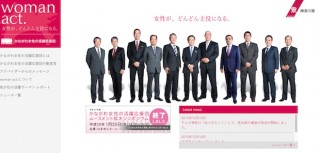Loading
Search
▼ Kanagawa Prefecture Promotes Female Empowerment With All-male Campaign
- Category:Other
Woman Act is a slightly awkwardly named Kanagawa Prefecture initiative aimed at bringing “women more and more into the main role”.
A worthy cause, we would all agree, in Japan’s acutely patriarchal (and gerontocratic) society.
However, Kanagawa decided to promote the project with a website and front image showing an all-male panel of corporate presidents. Quite a way to contradict yourself.
Given the name and the purpose of the initiative, you might expect to see at least some — or even just one — female face on the first page of the website. Instead, the visitor gets 11 men. One of them is Carlos Ghosn, the French-Lebanese-Brazilian CEO of (Yokohama-based) Nissan, who thus supplies the closest thing the image has to diversity.
“The power of women is the greatest latent force in Japan today,” the website says. Yes, so latent that even this campaign cannot show it.
The men are presented as the “Kanagawa Support Group for Activating Women”, which is certainly a patronizing title if ever there was one.
Kanagawa, with its bevy of influential and exciting places like Yokohama and Kamakura, must have lots of interesting female role models for the organizers to highlight. Surely they could have found some actual women to join this male supporters, as well-intentioned as they likely are.
As Quartz comments, “judging by what the Kanagawa government is offering up, even that may be too ambitious.”
Prime Minister Shinzo Abe has made quite a PR blitz out of his “womenomics” schemes. His National Act Plan to “get women to shine” was meant to involve filling 30% of all management positions with women by 2020. This would, he claimed, help boost the national economy out of the doldrums. This relatively modest target has now been downgraded to a mere 7% by 2021.
Currently just 3.5% of senior government jobs are held by women.
Another of Abe’s goals is to increase the female labor participation rate by 5% for women aged 25 to 44. Closing the gender employment gap could seriously boost domestic GDP, but at present 70% of women quit full-time work when they have a child, not least because there is a chronic shortage of childcare facilities in Tokyo and elsewhere, and there are also few financial incentives.
Men are paid 28% more than women on average. Men and women in Japan are also not allowed to retain separate surnames when they marry, despite recent legal challenges. And while the Crown Prince of Japan only has a daughter, Aiko, she will never ascend the Chrysanthemum Throne. Instead, her younger male cousin will succeed Naruhito.
- January 27, 2016
- Comment (0)
- Trackback(0)


